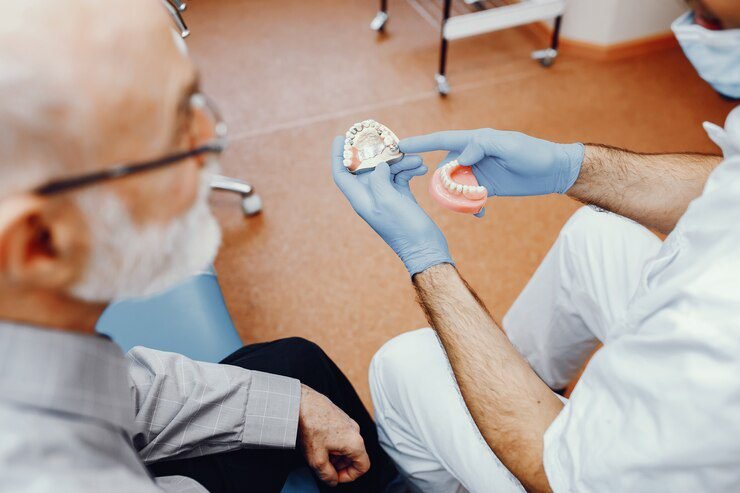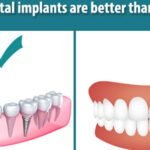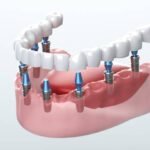Table of Contents
The Lifelike Appearance and Functionality of Dental Implants
Dental implants offer a remarkable solution for individuals seeking a lifelike appearance and functionality when it comes to replacing missing teeth. These innovative restorations are designed to blend seamlessly with the natural teeth, creating a stunning smile that is virtually indistinguishable from the real thing. With advances in technology and materials, dental implants have become a popular choice for patients looking for a long-term solution to tooth loss.
Not only do dental implants offer an aesthetically pleasing result, but they also provide exceptional functionality. Unlike traditional dentures, which can feel bulky and may require adhesive to stay in place, dental implants are securely anchored in the jawbone. This ensures that they stay firmly in place while speaking, eating, and performing daily activities. With dental implants, individuals can regain their confidence and enjoy a natural-looking smile that allows for a wide range of oral functions.

Enhanced Comfort and Confidence with Dental Implants
Dental implants offer enhanced comfort and confidence, making them an excellent solution for individuals with missing teeth or unstable dentures. Unlike traditional dentures, which can slip or cause discomfort, dental implants provide a stable and secure fit. This means that you can enjoy your favorite foods without worrying about them shifting or falling out.
Furthermore, dental implants are designed to look and feel like natural teeth. They are custom-made to match the color, shape, and size of your existing teeth, creating a seamless and lifelike appearance. With dental implants, you can confidently smile, speak, and laugh without any self-consciousness. The enhanced comfort and natural aesthetics of dental implants can truly transform your quality of life.
Additionally, dental implants offer long-lasting results, providing a durable and reliable solution for missing teeth. Unlike dental bridges or dentures, which may need to be replaced or adjusted over time, dental implants have a high success rate and can last a lifetime with proper care. This long-term durability ensures that you can enjoy the benefits of your dental implants for years to come, further enhancing your comfort and confidence.
Overall, dental implants not only restore your oral health and functionality but also bring a significant boost to your comfort and confidence. With their lifelike appearance, stability, and longevity, dental implants offer a permanent solution that can positively impact your everyday life.
Improved Oral Health and Hygiene with Dental Implants
Dental implants offer numerous benefits when it comes to improving oral health and hygiene. One of the key advantages is that they help preserve the natural structure of your mouth. Unlike traditional tooth replacement options such as dentures, dental implants are anchored directly into the jawbone, providing stability and preventing bone loss. This not only maintains the integrity of your facial structure but also reduces the risk of additional dental issues in the long run.
Additionally, dental implants are designed to mimic the look and function of natural teeth. They are seamlessly integrated into your smile, making it easier to maintain good oral hygiene practices. With dental implants, you can brush and floss your teeth just like you would with your natural teeth. This ensures that you can effectively remove plaque and food debris from all surfaces, reducing the risk of gum disease and tooth decay. By promoting proper oral hygiene, dental implants contribute to improved overall oral health and a reduced likelihood of future dental problems.

Long-Term Durability and Reliability of Dental Implants
Dental implants have gained widespread popularity as a long-term solution for tooth loss due to their remarkable durability and reliability. Made from biocompatible materials like titanium, these artificial roots are surgically placed into the jawbone, providing a strong foundation for replacement teeth. With proper care and maintenance, dental implants have the potential to last a lifetime, making them a valuable investment for patients seeking a permanent solution to missing teeth.
Numerous studies have demonstrated the impressive long-term success rates of dental implants. According to a systematic review published in the International Journal of Oral Maxillofacial Implants, the average survival rate of dental implants after 10 years is approximately 94.6%. This remarkable longevity can be attributed to the osseointegration process, where the implant fuses with the surrounding bone. As a result, the dental implant becomes a stable and reliable support for prosthetic teeth, allowing patients to chew, speak, and smile with confidence.
Not only do dental implants offer exceptional durability, but they also provide patients with the assurance of reliability. Unlike dentures, which may require adhesives or pastes for stability, dental implants are securely anchored to the jawbone, eliminating any worries of slippage or discomfort. This stable foundation not only enhances the overall functionality of the replacement teeth but also provides a natural and lifelike appearance. Patients can enjoy their favorite foods without restrictions, speak with clarity, and experience a boost in self-esteem and confidence.
In conclusion, the long-term durability and reliability of dental implants make them an excellent choice for patients seeking a permanent solution to missing teeth. With succes
s rates averaging around 94.6% after 10 years, dental implants offer a strong and stable foundation that can last a lifetime. This not only ensures longevity but also provides patients with the confidence and peace of mind they desire. By opting for dental implants, individuals can regain their oral function, enjoy a natural-looking smile, and experience an improved quality of life.
The Convenience of Dental Implants Compared to Dentures
Dental implants offer a remarkable level of convenience compared to traditional dentures. Unlike removable dentures, which require regular removal for cleaning and maintenance, dental implants provide a permanent solution that can be cared for just like natural teeth. This means that patients no longer have to worry about the inconvenience of taking out their dentures every night or worrying about them coming loose during meals or social interactions.
In addition, the convenience of dental implants extends to everyday tasks such as eating and speaking. With properly placed implants, patients can enjoy their favorite foods without restrictions or discomfort. Unlike dentures, which can slide or shift while eating, dental implants provide a stable and secure foundation, allowing for confident and effortless chewing. Similarly, dental implants allow for natural speech patterns, eliminating concerns about slurred or muffled speech that can sometimes arise with dentures.
Overall, the convenience offered by dental implants is unparalleled. With their permanent nature and ability to seamlessly integrate with the mouth, implants provide a hassle-free solution that allows patients to enjoy a more natural and normal lifestyle. Whether it’s the ease of care and maintenance or the freedom to eat and speak without limitations, dental implants prove to be a truly convenient option for those seeking to replace missing teeth.

Dental Implants: A Permanent Solution for Missing Teeth
Dental implants are a remarkable solution for individuals with missing teeth. Unlike other tooth replacement options, such as dentures or bridges, dental implants provide a permanent solution that closely mimics the look, feel, and function of natural teeth. Made of biocompatible materials like titanium, dental implants are surgically placed into the jawbone, where they fuse with the surrounding bone over time. This integration creates a stable and secure foundation for the replacement tooth or teeth that are attached to the implant.
One of the key benefits of dental implants as a permanent solution is their ability to restore proper chewing and speech capabilities. With dentures, some individuals may struggle with eating certain foods or speaking clearly. However, dental implants function just like natural teeth, allowing individuals to enjoy a diverse diet and speak with confidence. This improvement in oral function can greatly enhance a person’s overall quality of life and restore their self-confidence. Additionally, the permanence of dental implants eliminates the need for frequent adjustments or replacements, providing long-term reliability and peace of mind.
Dental Implants and Their Ability to Preserve Facial Structure
The loss of teeth can have a significant impact on the structure of our face. When teeth are missing, the jawbone starts to deteriorate, which can lead to a sunken and sagging appearance. This is where dental implants play a crucial role in preserving facial structure.
Dental implants are designed to function like natural teeth, not only providing a lifelike appearance but also stimulating the jawbone. By placing an implant directly into the jawbone, it acts as a replacement for the root of a tooth. This stimulates the surrounding bone, preventing it from deteriorating over time.
Preserving the jawbone through dental implants helps maintain the natural contours of the face and prevents the collapse of facial structures. This means that individuals who opt for dental implants not only regain their beautiful smile but also retain the fullness and youthfulness of their facial features.
Without the preservation of facial structure, individuals with missing teeth may experience a loss of self-confidence due to the changes in their appearance. Dental implants not only provide a long-term solution for missing teeth but also go beyond aesthetics by ensuring that the facial structure remains intact.
| Aspect | Explanation |
|---|---|
| Functionality | Dental implants provide stable support for artificial teeth, enabling proper chewing, speaking, and smiling. |
| Bone Preservation | Implants stimulate the jawbone, preventing bone loss and maintaining facial contours. |
| Prevention of Facial Collapse | By replacing missing teeth roots, implants help prevent the collapse of facial muscles and structures. |
| Aesthetic Benefits | Implants restore natural facial appearance by filling gaps left by missing teeth. |
| Long-Term Stability | With proper care, dental implants can last for decades, maintaining facial structure over the long term. |
The Natural Speech and Eating Benefits of Dental Implants
Dental implants not only provide a natural-looking smile, but they also offer a multitude of benefits when it comes to speech and eating. Unlike dentures, which can sometimes slip or affect speech clarity, dental implants are fixed securely in the jawbone, allowing for improved articulation and enunciation. This means that patients can speak with confidence and clarity, without worrying about any embarrassing moments or slurred speech. Whether it’s giving a presentation at work, chatting with friends, or enjoying a conversation with loved ones, dental implants can truly enhance one’s ability to communicate effectively.
When it comes to eating, dental implants offer exceptional functionality and comfort. With traditional dentures, certain foods may need to be avoided or modified due to their sticky, hard, or chewy nature. Dental implants, however, provide a stable foundation for chewing and biting, making it easier to enjoy a wide variety of foods. From crunchy vegetables to juicy steaks, dental implant recipients can relish in the pleasure of eating without any discomfort or restrictions. With dental implants, individuals can savor their favorite meals with confidence, knowing that their teeth are secure and reliable.
Dental Implants: A Cost-Effective Long-Term Investment
When considering options for tooth replacement, it is important to evaluate the long-term financial implications. Dental implants, although initially more costly than dentures or bridges, are a cost-effective long-term investment. Unlike other tooth replacement options, dental implants are designed to be a permanent solution, providing durability and reliability for many years. This eliminates the need for frequent replacements and associated costs. In fact, studies have shown that when properly cared for, dental implants can last a lifetime, making them a wise financial decision in the long run.
Furthermore, the cost-effectiveness of dental implants extends beyond their lifespan. With dentures or bridges, ongoing maintenance and repairs can accumulate over time, leading to additional expenses. On the other hand, dental implants require minimal maintenance and care, similar to natural teeth. This means less visits to the dentist for adjustments or replacements, resulting in potential savings over the years. Additionally, dental implants can help prevent further oral health issues that may require costly treatments down the line, such as bone loss or shifting of surrounding teeth. By addressing these concerns, dental implants can contribute to overall oral health and potentially reduce the need for future dental interventions.
| Factor | Dental Implants | Dentures |
|---|---|---|
| Initial Cost | Higher initial cost due to surgery and materials | Lower initial cost |
| Longevity | Can last a lifetime with proper care | Typically need to be replaced every 5-10 years |
| Maintenance | Similar to natural teeth, requires regular brushing and flossing | Requires regular cleaning and occasional adjustments |
| Comfort | Feel like natural teeth | May cause discomfort and require adjustment period |
| Bone Health | Stimulates jawbone, preventing bone loss | Does not stimulate jawbone, can lead to bone resorption |
| Eating & Speaking | Function similar to natural teeth | May affect speech and ability to chew certain foods |
| Aesthetics | Mimics natural teeth appearance | Appearance may not be as natural |
| Confidence | Restores confidence in smile and function | May affect confidence due to potential movement |
| Impact on Adjacent Teeth | Does not affect adjacent teeth | May put pressure on adjacent teeth |
The Minimal Maintenance and Care Required for Dental Implants
Dental implants are a popular and effective solution for replacing missing teeth. One of the many advantages of dental implants is the minimal maintenance and care required to keep them in excellent condition. Unlike dentures, which often require adhesives and daily removal for cleaning, dental implants are designed to function and feel like natural teeth, requiring very little additional effort for maintenance.
To ensure the longevity and success of your dental implants, it is important to follow a regular oral hygiene routine. This includes brushing your teeth twice a day with a soft-bristle toothbrush and fluoride toothpaste. Flossing around the implant area is also crucial to remove any plaque or debris that might accumulate. Additionally, visiting your dentist for regular check-ups and professional cleanings is recommended to monitor the health of your implants and address any potential issues early on.
Overall, the minimal maintenance and care required for dental implants make them a convenient and hassle-free solution for missing teeth. With proper oral hygiene practices and regular dental visits, you can enjoy the benefits of your dental implants for many years to come.
Dental Implants and their Ability to Prevent Bone Loss
Bone loss in the jaw can be a common consequence of tooth loss. When a tooth is missing, the surrounding bone no longer receives stimulation from the tooth root, causing it to deteriorate over time. This can lead to a weakening of the jawbone structure and potentially impact the overall facial appearance. However, dental implants have a unique ability to prevent bone loss and provide long-term stability.
Dental implants are titanium posts that are surgically placed into the jawbone, mimicking the function of natural tooth roots. As the jawbone heals around the implant, a process called osseointegration takes place, in which the bone fuses with the implant, creating a solid foundation. This integration not only provides a stable base for the replacement tooth, but it also stimulates the jawbone, preventing bone loss.
With dentures or other tooth replacement options, the jawbone continues to deteriorate over time due to lack of stimulation. However, dental implants preserve the bone structure by acting as artificial tooth roots, effectively halting the bone loss process. This not only ensures the longevity of the implant itself but also helps maintain the overall facial structure and prevent the sunken-in appearance that can occur with significant bone loss.
Dental Implants: The Ability to Enjoy a Diverse Diet
Dental implants offer individuals the ability to enjoy a diverse diet, free from the limitations often associated with missing teeth or traditional dentures. With dental implants, individuals can once again savor a wide range of foods, including crunchy fruits and vegetables, chewy meats, and even sticky treats. Unlike dentures, which can slip or shift while eating, dental implants provide a stable and secure foundation for chewing, enabling individuals to confidently enjoy their meals without fear of embarrassment or discomfort.
The success of dental implants in facilitating a diverse diet lies in their strong and durable structure. Composed of biocompatible materials such as titanium, dental implants fuse with the jawbone over time, creating a stable and long-lasting anchor for replacement teeth. This firm integration ensures that the implants effectively distribute the forces exerted during chewing, allowing for efficient and effective mastication. As a result, individuals with dental implants can enjoy a diverse range of foods and maintain a balanced and nutritious diet, supporting overall health and well-being.
The Psychological and Emotional Benefits of Dental Implants
Dental implants offer more than just physical benefits; they also have a significant impact on a person’s psychological and emotional well-being. When a person loses a tooth or multiple teeth, it can lead to feelings of embarrassment, self-consciousness, and lowered self-esteem. However, dental implants provide a lifelike and permanent solution to missing teeth, helping individuals regain their confidence and improve their overall quality of life.
Having a complete and natural-looking smile can boost a person’s self-image and positively affect their social interactions. With dental implants, individuals can confidently speak, laugh, and smile without worrying about gaps or dentures slipping. This newfound sense of self-assurance can have a ripple effect on various aspects of life, from personal relationships to professional opportunities. In fact, studies have shown that dental implants can contribute to improved social and emotional well-being, leading to enhanced overall happiness and a greater sense of fulfillment.
In addition to the psychological benefits, dental implants can also alleviate anxiety and worry about the long-term consequences of tooth loss. Unlike other tooth replacement options, such as dentures, dental implants are designed to be a permanent, durable solution. This reliability and stability provide peace of mind, knowing that the implants will function and look like natural teeth for many years to come. Moreover, dental implants have a success rate of up to 98%, making them a highly trusted and effective treatment option for individuals seeking long-term tooth replacement solutions.
Overall, dental implants not only restore the physical appearance and functionality of missing teeth, but they also have profound psychological and emotional benefits. By improving self-confidence, enhancing social interactions, and providing long-term reliability and stability, dental implants can truly be a life-changing solution for those struggling with tooth loss.
Dental Implants: A Superior Alternative to Dentures for Jaw Stability
Dental implants offer a superior alternative to dentures when it comes to jaw stability. Unlike dentures, which can become loose or move around while eating or speaking, dental implants are firmly anchored in the jawbone, providing a stable foundation for replacement teeth. This stability not only enhances the overall comfort and functionality of the implants but also improves speech clarity and the ability to chew properly.
One of the key factors contributing to the superior jaw stability of dental implants is the osseointegration process. During this process, the titanium implant fuses with the jawbone, creating a strong bond that mimics the natural tooth root. This integration allows the implants to withstand the forces of biting and chewing without shifting or causing discomfort. As a result, individuals with dental implants can enjoy a more secure and predictable dental restoration option compared to dentures.
In addition to the enhanced stability, dental implants also offer the benefit of preserving the natural structure of the jaw. When teeth are lost, the underlying bone can gradually deteriorate over time due to lack of stimulation. Dentures, while they restore the appearance of teeth, do not provide the necessary stimulation to prevent bone loss. On the other hand, dental implants simulate the chewing forces that the jawbone needs to maintain its density and prevent resorption. By preserving the jaw structure, dental implants not only support the replacement teeth but also contribute to a more youthful appearance and a healthier overall oral environment.
The Enhanced Quality of Life Dental Implants can Provide
With the advancements in dental technology, dental implants have become a game-changer in enhancing the quality of life for individuals with missing teeth. Not only do dental implants restore the appearance of a natural smile, but they also provide a multitude of functional benefits. Patients who opt for dental implants experience improved oral function, allowing them to eat and speak with confidence and ease.
Dental implants are designed to fuse with the jawbone, providing a strong foundation for replacement teeth. This stability ensures that the prosthetic teeth stay securely in place, avoiding any discomfort or embarrassment associated with dentures slipping or sliding. As a result, individuals with dental implants can enjoy their favorite foods without restrictions, leading to a more diverse and enjoyable diet. Furthermore, the ability to speak naturally and clearly plays a crucial role in boosting self-confidence, allowing individuals to participate fully in social and professional settings.
In conclusion, dental implants offer a multitude of benefits that greatly enhance the quality of life for individuals with missing teeth. From improved oral function to increased comfort and confidence, dental implants provide a superior alternative to other tooth replacement options. By choosing dental implants, individuals can enjoy the freedom to eat, speak, and smile without limitations, ultimately leading to a more fulfilled and enjoyable life.
Dental Implants: A Life-Changing Solution for Missing Teeth.
Missing teeth can greatly impact a person’s overall quality of life, affecting their ability to speak clearly, chew properly, and feel confident in their appearance. Fortunately, dental implants offer a life-changing solution for those in need of restoring their smile. Unlike dentures or other temporary options, dental implants are a permanent solution that closely mimic the appearance and functionality of natural teeth.
One of the key advantages of dental implants is their lifelike appearance. Made from durable materials such as titanium, implants are surgically placed into the jawbone, creating a strong foundation for the replacement tooth or teeth. The prosthetic teeth are carefully crafted to match the color, shape, and size of the patient’s existing teeth, resulting in a seamless and natural-looking smile. This aspect not only enhances the patient’s self-confidence but also improves their overall oral health and well-being. With dental implants, individuals can enjoy a restored smile that is virtually indistinguishable from their natural teeth, allowing them to eat, speak, and laugh with ease and confidence.
What are dental implants made of?
Dental implants are typically made of a titanium alloy, which is biocompatible and allows for osseointegration with the jawbone.
How long does the dental implant procedure take?
The duration of the dental implant procedure can vary depending on individual cases, but on average, it can take several months. This includes the healing period after implant placement and the placement of the final restoration.
Can anyone get dental implants?
In general, most individuals who have healthy gums and a sufficient amount of jawbone can be candidates for dental implants. However, certain medical conditions or habits like smoking may affect the success of the procedure.
Is the dental implant procedure painful?
The dental implant procedure is typically performed under local anesthesia, ensuring that patients do not experience pain during the surgery. Some discomfort and swelling may occur during the healing process, but this can be managed with medication prescribed by the dentist.
Can dental implants be used to replace multiple missing teeth?
Yes, dental implants can be used to replace multiple missing teeth. Depending on the individual case, a dental implant-supported bridge or denture can be designed to restore the functionality and appearance of multiple missing teeth.
Are dental implants covered by insurance?
Coverage for dental implants can vary depending on the insurance provider and the specific policy. While some dental insurance plans may cover a portion of the cost, it is recommended to check with the insurance company to understand the coverage details.
How long do dental implants last?
With proper care and maintenance, dental implants have the potential to last a lifetime. Regular dental check-ups and good oral hygiene practices are important to ensure the longevity of dental implants.
Can dental implants be done on the same day as tooth extraction?
In some cases, immediate dental implant placement can be done on the same day as a tooth extraction. However, this is determined on an individual basis and depends on factors such as the condition of the jawbone and the specific case.
Are there any restrictions on eating with dental implants?
Dental implants provide a secure and stable foundation for eating, allowing individuals to enjoy a diverse diet. There are generally no major restrictions on eating with dental implants, as they function similarly to natural teeth.
Can dental implants be rejected by the body?
Dental implants have a high success rate, and rejection or failure is rare. However, in some cases, the body may not integrate with the implant, leading to implant failure. This can be minimized by proper treatment planning and following post-operative care instructions.












